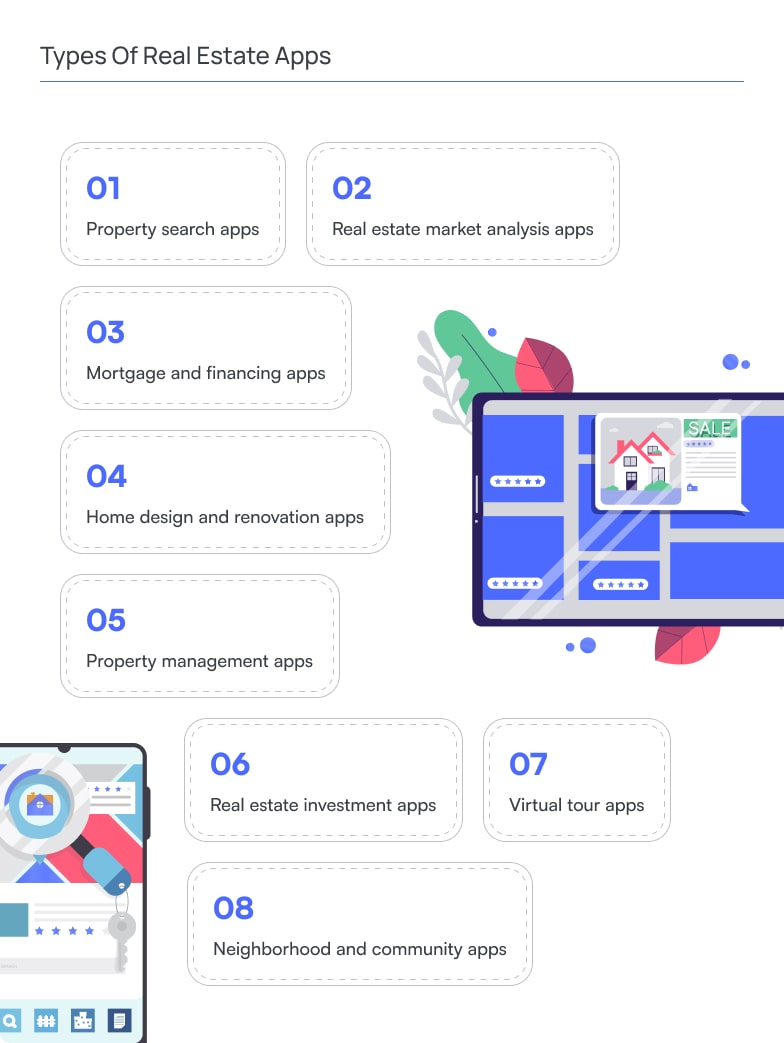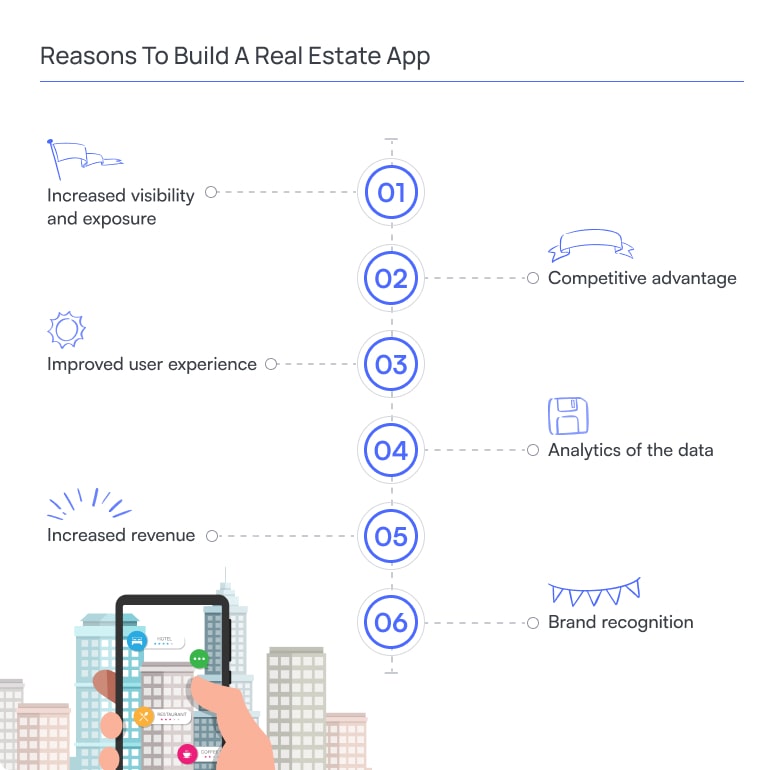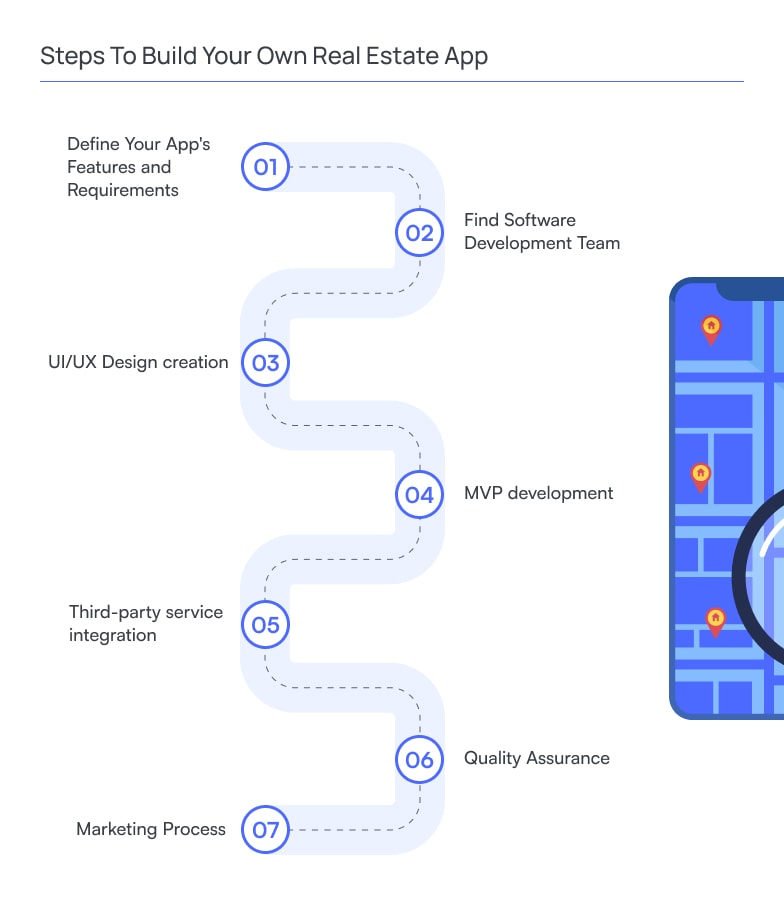Real estate mobile application development has transformed how people search for and buy properties. As the real estate industry embraces digital solutions, mobile apps have become essential for real estate agents, buyers, and sellers. With a wide range of features and functionalities, these apps provide users a more convenient and efficient way to browse listings, schedule appointments, and complete transactions.
In this article, we will explore the various aspects of real estate mobile application development, including the benefits for users and agents, core features to include, and steps you need to take to make your own real estate app. Whether you are a real estate agent looking to improve your productivity or a buyer searching for your dream home, this article will provide valuable insights into real estate mobile application development tricks.
Types Of Real Estate Apps
First, it is necessary to make a list of real estate apps by type. It will help you better understand what app type you need for your niche.

Property search apps. These apps allow users to search for properties for sale or rent and typically include a range of filters and search criteria to help users find exactly what they are looking for.
Real estate market analysis apps. They provide data on real estate markets, including trends, pricing, and other vital metrics. They can be used by real estate professionals, investors, and homebuyers to make informed decisions about buying and selling property.
Mortgage and financing apps. Mortgage apps provide information on mortgage rates, financing options, and calculators to help users determine how much they can afford to borrow and their monthly payments.
Home design and renovation apps. Such apps allow users to visualize and plan home renovations and interior design projects and may include tools for creating 3D models or virtual reality tours.
Property management apps. They are designed for landlords and property managers and typically have features for managing rental properties, collecting rent, and communicating with tenants.
Real estate investment apps. These apps are designed for investors looking to buy and sell real estate and may include features for analyzing potential investments, tracking properties, and managing portfolios.
Virtual tour apps. They allow users to explore properties virtually through 360-degree images or virtual reality tours. However, the virtual tour feature is available in many real estate apps today. So if you think about real estate app development, there might be no sense in creating only a virtual tour app.
Neighborhood and community apps. This type of real estate app provides information on local amenities, schools, crime rates, and other factors influencing a homebuyer’s decision to purchase in a particular area.
Reasons To Build A Real Estate App
Any mobile app development should come with potential profit and advantages. Real estate apps are no exception. We provide some reasons why you should build a real estate app.

Increased visibility and exposure
Building a real estate app can help increase the visibility and exposure of your real estate business or listings. In addition, you can attract more potential buyers or renters by offering a convenient and user-friendly app for users to search for properties.
Competitive advantage
In today’s digital age, having a real estate app can give you a competitive advantage over other real estate businesses that do not offer this service. It can set you apart as a modern and innovative business and help you stay ahead of the curve.
Improved user experience
Real estate apps can provide property searchers with a more streamlined and efficient user experience. Users can easily filter and search for properties, save their favorite listings, and receive alerts for new listings that match their criteria.
Data analytics
You can gather valuable user behavior and preferences data by building a real estate app. This data can help you make informed decisions about your real estate business, such as which types of properties to invest in or which marketing strategies to use.
Increased revenue
A real estate app can help you generate more revenue by attracting more potential buyers or renters and providing additional services such as mortgage calculators or property management tools.
Brand recognition
Mobile app development for real estate can also help increase brand recognition and establish your business as a trusted and reliable source of real estate services. In addition, it may lead to more referrals and repeat business over time.
Real Estate Mobile App Features
You can add different features to your real estate app, so it is easier to predict what feature list your app will have once you provide us with all the requirements. However, there are core features the app for real estate must have. Let’s see them.
Onboarding
The process of acquainting individuals with your application is referred to as onboarding. It educates users about the key features and benefits of real estate applications. After completing the onboarding phase, users may proceed with registration or log in with social networks.
It would be advantageous to offer users the option to bypass the registration process if they want to explore the app initially. Although we focus on the fundamental aspects of real estate rental, purchase, and sale applications, onboarding is a universal practice for all real estate mobile applications.
Sign-up
The sign-up feature in real estate mobile apps enables users to register or log in and access the app’s features depending on its purpose, such as buying, selling, or booking properties. Typically, a basic registration process asks for the user’s name, email, and password, sufficient for app entry, while additional profile details can be added later. Allowing users to log in with social media accounts like Facebook, Google, or Twitter is also helpful. The registration feature is standard across all types of real estate mobile applications.
User Profile
In developing a real estate mobile application, it is crucial to establish distinct user profiles with varying roles. The required roles will vary depending on the type of real estate app in question. For instance, rental and home purchase apps will require buyer and real estate agent profiles, realtor apps will require buyer and broker profiles, and office rental apps will require renter profiles.
Each user role must be granted access to specific functions pertinent to their roles. Agents, for example, will need access to their properties, appointments, schedules, and profiles of prospective buyers. Likewise, buyers and renters should have access to their lists of preferred properties and advanced searching and filtering features.
Typically, any real estate mobile app will provide its users with personal profiles. However, it is crucial to authenticate users before allowing them to engage in property rental, purchase, or sale.
Advanced Search
Also, when you learn how to build a real estate app, you should consider adding a search bar with filters. Looking for the perfect property can be challenging but a pleasant experience with the right tools. Real estate apps typically offer a search feature to help users find their ideal property. However, the filtering options may vary depending on the app type.
To enhance the user experience, it is helpful to include a variety of advanced categories, services, and filters. These filters can include the number of rooms, beds, home type, reviews, amenities, services, dates, and location. Additional filters may be developed for other apps, such as buying and selling apps, including home size, lot size, garage, exterior features, and community amenities.
Listings
Real estate mobile apps rely heavily on listings, which provide detailed information about the properties available for purchase or rent. As a result, these listings serve as a comprehensive database of properties users can browse.
As such, the size of your listing database is a critical factor in the success of your real estate app. The more extensive your database, the more likely potential buyers will find what they are looking for and be satisfied with the selection of properties on offer. Therefore, it’s essential to prioritize the development and maintenance of a substantial listings database to ensure the success of your real estate app.
Virtual Tour
Offering complete visualization through 3D pictures and tours of a property is an excellent way to showcase the facility before a physical visit. With this panorama view, clients can understand the entire apartment or dwelling comprehensively, making it easier to decide if it meets their needs.
The convenience and accuracy of this option are highly appreciated by clients, who frequently take advantage of it. By providing 3D pictures and tours, you can enhance the user experience, increase client satisfaction, and even save time by narrowing down the properties clients want to see in person.
Calendar
The calendar feature in a real estate mobile app is valuable for property buyers and agents by providing an easy way to schedule offline appointments at a convenient date and time.
This feature is available almost in all real estate mobile apps, making it effortless for users to find suitable dates for booking property viewings, buying or selling a property, scheduling meetings with agents or business clients, and setting appointments.
By incorporating a calendar feature into your real estate app, you can streamline the appointment scheduling process, save time, and provide clients with a more efficient and user-friendly experience. We also have an article on how to make a calendar app, which can offer valuable insights.
Geolocation
Maps play a crucial role in showcasing the location of a desired property to potential buyers. However, they can do much more than that.
In a real estate mobile app, maps can provide buyers with essential data about the neighborhood, including infrastructure, transportation, nearby stores, crime rates, and the risk of natural disasters. By incorporating this information into the app maps, buyers can make a more informed decision about whether a particular property is a right fit for them.
Push notifications
When developing a real estate mobile app, it’s crucial to include push notification services as an essential feature to retain users and keep them informed of critical events.
Push notifications are commonly used in real estate apps to alert users to price changes, new properties, agents’ services, and updates on listings. By leveraging this feature, you can provide timely and relevant information to your users, keeping them engaged and informed.
Mortgage Calculator
A mortgage calculator is one of the most critical real estate app features, allowing users to estimate their monthly mortgage payments conveniently .
By incorporating this feature into your app, users can input the loan amount, interest rate, and other relevant information to calculate their monthly payments. This information is invaluable for users, helping them to plan and budget effectively for their new property.
Additionally, a mortgage calculator feature can help attract and retain users, offering a valuable tool that sets your app apart from others in the market.
Property Page
Real estate agents need to be able to share detailed information about the properties they are selling, renting, or building on the property page. It requires the ability to upload property photos, provide descriptions, specify pricing and availability, list amenities and services, and more. The development of property pages is a standard feature found in real estate apps for renting, buying/selling, and home valuation.
Ratings and reviews
Genuine ratings and reviews are crucial for evaluating realtors, housing conditions, neighbors, and the environment. Therefore, all users need to be able to leave reviews and give ratings. It helps other users make informed decisions and increases the likelihood of more people benefiting from the program as they recommend it to their acquaintances.
Favorites
Including a wishlist feature in a real estate mobile app enables users to shortlist and select their preferred properties easily. By allowing users to save their favorite properties, they can spend less time searching and easily access the properties they liked before. The Favorite feature is common in home valuation, renting, and buying and selling apps.
Steps To Build Your Own Real Estate App
Who owns the information owns the world. If you want to do something efficiently, you should know the secrets. We will list the main steps that show how to make a real estate app.

Define Your App's Features and Requirements
Determine what features you want your app to have, such as property search functionality, filtering and sorting options, virtual tours, mortgage calculators, and more. Next, consider what platforms you want your app to be available on, such as iOS, Android, or both. Or you need a cross-platform app which is a more cost-effective solution. Binerals is an expert in cross-platform and native app development.
Find Software Development Team
Finding a software development team before starting your project is essential because it helps you ensure it is developed efficiently, effectively, and to the highest quality standards.
A skilled development team should have the expertise and experience to help you identify and define your project requirements, design and develop the application architecture, select the right technologies, and make the app in a timely and cost-effective manner.
We recommend outsourcing software development, which will help you save your budget. So as not to overload you with information, read our article explaining how to hire software developers in Ukraine.
UI/UX Design
Then, UI/UX designers map out your app’s user flow and navigation and design a user interface that is intuitive and easy to use.
A real estate app’s UI/UX design is critical to its success because it directly impacts user engagement, satisfaction, and adoption rates. An intuitive, user-friendly interface and a visually appealing design are key factors in attracting and retaining users and driving conversions and sales.
MVP development
Developers at Binerals know how to make an app for real estate. First, they build the server-side infrastructure to power your app, such as the database, APIs, and other backend services. Then they create the user-facing portion of your app, including the visual design and user interface elements.
However, we recommend you start with MVP development. An MVP (Minimum Viable Product) is an essential concept in app development, including real estate app development. An MVP is a basic app version with only the necessary features and functionality to satisfy early adopters and test the market.
Developing an MVP first has become increasingly popular as it can help your real estate business or startup minimize the development cost and risk while gaining valuable insights into their target audience.
Third-party service integration
Integrate any third-party services you want to include in your app, such as payment processing, analytics, or social media integration.
Integrating third-party services into a real estate app can enhance the app’s functionality and provide a better user experience.
For example, third-party services such as mapping and location-based services (Google Maps), mortgage calculators, property valuation tools (Zestimate ), and virtual tours (Matterport) are essential for a real estate app’s success.
Quality Assurance
QA engineers at Binerals thoroughly test your app for bugs and errors and address any issues. In addition, QA helps ensure that the app functions correctly and performs the tasks it is designed to do. It includes checking that all features and functionalities work as expected and the app operates seamlessly across all devices and platforms.
Marketing Process
When the app is released, you must promote it through various channels, such as social media, email marketing, and paid advertising, to attract users and increase downloads.
How Much Will It Cost To Create Your Own Real Estate App?
You may be curious about the associated expenses if you consider investing in app development for your real estate business. The truth is app development costs can vary widely based on numerous factors. Critical factors affecting the cost of developing a real estate mobile app include the desired features, design, device type (iOS and/or Android), and technology used.
Additionally, the hourly rate charged by the development company is a significant factor that can influence the overall cost. Hourly rates can vary significantly depending on the location of the app development company. For example, companies in North America typically charge between $100 to $250 per hour.
In contrast, you can find more cost-effective options in Eastern Europe, like in Ukraine (where our company is located). Anyway, if you need a detailed estimate, you can provide us with all the requirements of your future project so that we can calculate everything precisely.
Wrapping Up
When you know how to create a real estate app wisely, it can eventually provide a competitive edge and improve customer satisfaction. However, it’s essential to carefully consider various factors before embarking on the development process.
Defining your target audience and their needs, determining the app’s features and functionality, creating an intuitive user interface, selecting the right technology and development team, and evaluating the cost considerations are all crucial for the success of your app.
By following these guidelines and creating an app that provides value to your business and customers, you can make a powerful tool that helps your business grow and thrive in the increasingly competitive real estate market.
Binerals will be your best real estate app development partner
Contact us!What are the benefits of real estate app development?
The main benefits of real estate app development include increased visibility and exposure, competitive advantage, improved user experience, data analytics, increased revenue, and brand recognition.
What are the steps to build your real estate app?
First of all, you need to determine the requirements of your future app and consider the features that are to be integrated. Then you need to hire an outsourcing software development team. The team will create UI/UX design and build an MVP (a version with basic functions to test your app). Also, the team can integrate additional third-party services if necessary. Then, QA engineers test your app thoroughly, and it is released.
How much does my real estate app development cost?
Before beginning development, defining a clear budget and working closely with your development team to control costs is essential. You need to consider the cost of design, number of features, tech stack, and what platforms you need the app for (iOS and/or Android).
Additionally, using cost estimation tools and carefully evaluating the hourly rates of development companies can help you stay within your budget.
